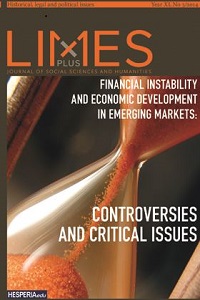Revisiting the Washington Consensus Debate Today
Revisiting the Washington Consensus Debate Today
A Theoretical Appraisal of International Institutions Prescriptions to Emerging Economies
Author(s): Christine SinapiSubject(s): Supranational / Global Economy, Financial Markets, Socio-Economic Research
Published by: HESPERIAedu
Keywords: Augmented Washington Consensus; Financial liberalization; Institutional development; Financial crisis; Emerging economies; Minsky
Summary/Abstract: During the 1990’s, emerging economies largely engaged in financial liberalization process, following the prescriptions (or commandments) of international institutions, namely the International Monetary Fund and the World Bank. Yet, at the end of the nineties, instead of experiencing the promised economic growth, the more financially integrated emerging economies were hit by major financial crises of severe economic impact. We examine, in this paper, the way international institutions reacted to the apparent failure of their economic models and predictions. We synthetize the main arguments of the theoretical debate that followed the 1990’s emerging economies crises, and the way international institutions incorporated it, in the form of the so-called ”Augmented Washington Consensus“ (AWC). We observe that the standard economic views endorsed by the IMF did recognize that liberalizations policies and crises were related in emerging economies. They however failed to admit that financial liberalization may be among the causes of the instability, blaming instead the process of implementation (too rapid or disordered) of liberalization and/or some pre-existing macroeconomic insufficiencies, such as lacking fiscal discipline or inadequate legal and regulatory framework. We argue, in this paper, that although the IMF proved able to adjust its views in the face of undisputable facts, this adjustments remain insufficient and the dominant economic views regarding financial liberalization keep a dogmatic character. Regarding policy recommendation changes, they mainly focus on institutional development objectives, added in the AWC. This is obviously a highly desirable target. However, we argue that the standard approaches of institutions endorsed by international institutions, which primarily address asymmetries of information effects, globally miss the point. Institutions of financial systems need to be incorporated to the analysis first – and not added afterword. They require to be assessed in the historical context and stage of development of each economy. In this perspective, Minsky’s approach of financial instability and institutional mechanisms constitutes in our view a promising theoretical alternative. Today, international institutions are once more providing both help and policy ”recommendations“ to emerging economies, often pushing governments to adopt policies denied by their population. Revisiting the debate around the Washington consensus and financial liberalization proves an unclosed subject.
Journal: LIMESplus
- Issue Year: 2014
- Issue No: 3
- Page Range: 29-52
- Page Count: 24
- Language: English

